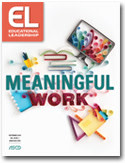Research Alert
Make It Meaningful!
This just in from 42,000 high school students: They're mostly bored, and they often don't see the value in the work that teachers ask them to do. The recently releasedCharting the Path from Engagement to Achievement: A Report on the 2009 High School Survey of Student Engagementlooks at student answers to such questions as,
- If you have been bored in class in high school, why are you bored?
- Are you challenged academically in your classes?
- Does your work in high school contribute to your growth in thinking critically? Writing and speaking effectively? Reading and understanding challenging materials? Learning independently? Acquiring skills related to work after high school? Solving real-world problems?
Two of three respondents (66 percent) indicated that they are bored at least every day in class. But students also clarified the kinds of work that would engage them. They rated the following most highly: discussion and debate (61 percent); group projects (60 percent); and projects and lessons involving technology (55 percent). Following close behind as favorites were presentations (46 percent); role-plays (43 percent); and art and drama activities (49 percent). It's no surprise that teacher lecture got the highest "like not at all" votes (44 percent) and the fewest "like very much" votes (6 percent). Students also indicated that they enjoy discussions in which there are no clear-cut answers (65 percent) and that they would welcome the opportunity to be more creative in school (82 percent).
PageTurner
As a teacher once said, "I never heard of a student not doing his work; it's our work he's not doing."
—Cathy Vatterott, p. 10
Numbers of Note
The World Spin
Was That Homework—or Housework?
In New Zealand, Enner Glynn School has introduced homework grids in some of its classes that let students include tasks like washing dishes or music lessons in their list of homework tasks. Research by an Auckland University education professor questioning the benefits of homework was one reason prompting the changes.
According to the school principal, "One of the arguments against homework is that it's not good in the family environment because you tend to. . .opt out of family stuff, like doing dishes, etc. We're looking at ways to make sure that doesn't happen."
Including everyday tasks as homework teaches children about the importance of participation and contributing, which are part of the national curriculum, the principal said.
Relevant Reads
Two recent books pose thought-provoking questions about the meaning of education.
- Why School? by Mike Rose (New Press, 2009). What does it mean to be educated? What should schools teach, and how? As a society, we haven't yet satisfactorily answered these basic questions, says Rose, a UCLA professor and experienced educator, researcher, and author. Rose outlines a broad vision of the intellectual, social, civic, ethical, and aesthetic goals of schooling in a democratic society." We've narrowed the purpose of schooling to economic competitiveness, our kids becoming economic indicators. We've reduced our definition of human development and achievement—that miraculous growth of intelligence, sensibility, and the discovery of the world—to a test score. (p. x)"
- The Path to Purpose by William Damon (Free Press, 2009). In conducting research (with Howard Gardner and Mihaly Csikszentmihalyi) on individuals who made positive contributions to society, Damon was struck by the fact that these individuals were almost universally guided by a strong sense of a larger purpose. Yet many young people today lack this sense of purpose, says Damon. In this book, he explores the questions of how young people find a sense of purpose, what happens when they don't, and how schools can help." What do I hope to accomplish with all my efforts, with all the striving that I am expected to do? What are the higher goals that give these efforts meaning? What matters to me, and why should it matter? What is my ultimate concern in life? Unless we make such questions a central part of our conversations with young people, we can do little but sit back and watch while they wander into a sea of confusion, drift, self-doubt, and anxiety. (p. xii)"
Only Online
The Science of the Spill
Want to link science, social studies, or political science content to the Deepwater Horizon (BP) oil well spill? Check out this collection of free resources gathered by the American Association for the Advancement of Science (AAAS). There are teaching suggestions for different grade levels, videos of the gulf coast ecosystem, an interactive map showing the spread of the spill, and links to online lessons on everything from how ecosystems naturally purify water (including a virtual tour of an "urban river") to role plays on the trade-offs between development and preserving the environment.
You'll also find a collection of news articles on the science of the oil spill. This is one of many gems offered through AAAS's ScienceNetLinks, a clearinghouse of resources for K–12 science teachers.
WolframAlpha.com
This fascinating computational knowledge engine aims "to collect and curate all objective data; implement every known model, method and algorithm; and make it possible to compute whatever can be computed about anything."
Want to compute the properties of 28? Compare the population densities of Finland, Sweden, and Denmark? Generate a star chart for your geographical area? WolframAlpha's 10+ trillion pieces of data cover such areas as mathematics, statistics, health and medicine, technology, earth and life science, and people and history. So ask away.


